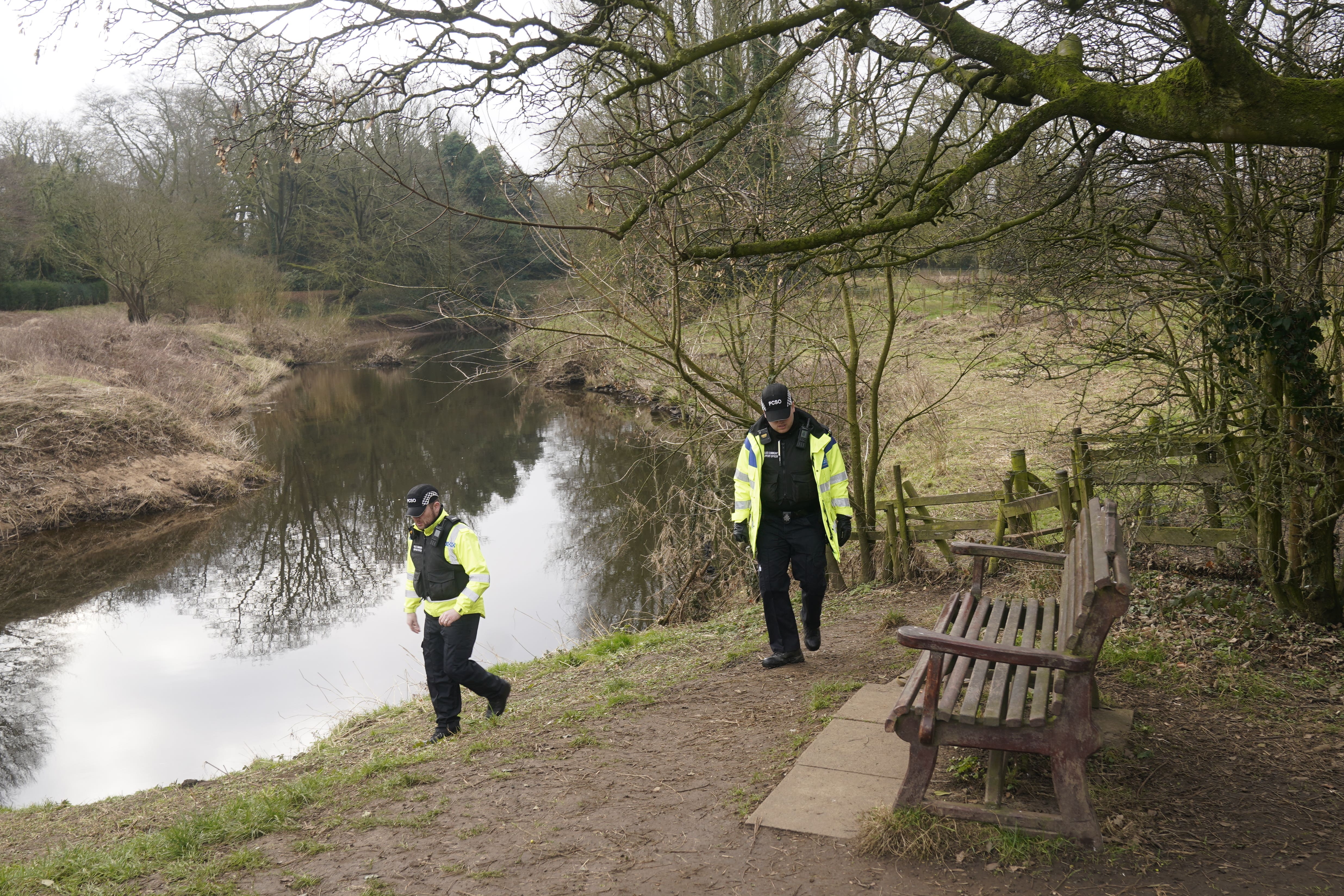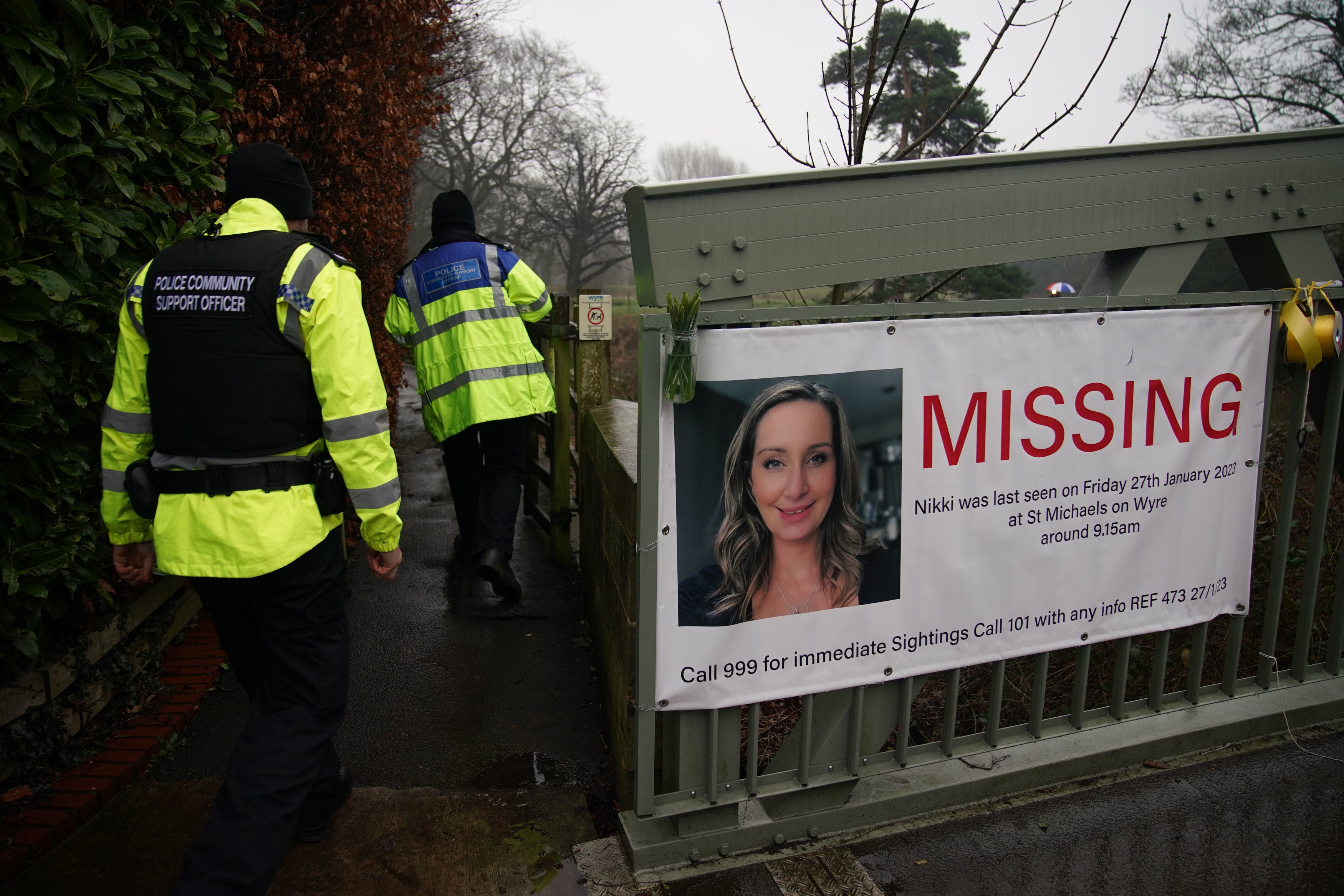Nicola Bulley police review criticises force for revealing missing mother’s health struggles
Lancashire Police’s disclosure of personal information was ‘avoidable and unnecessary’, finds report
Your support helps us to tell the story
From reproductive rights to climate change to Big Tech, The Independent is on the ground when the story is developing. Whether it's investigating the financials of Elon Musk's pro-Trump PAC or producing our latest documentary, 'The A Word', which shines a light on the American women fighting for reproductive rights, we know how important it is to parse out the facts from the messaging.
At such a critical moment in US history, we need reporters on the ground. Your donation allows us to keep sending journalists to speak to both sides of the story.
The Independent is trusted by Americans across the entire political spectrum. And unlike many other quality news outlets, we choose not to lock Americans out of our reporting and analysis with paywalls. We believe quality journalism should be available to everyone, paid for by those who can afford it.
Your support makes all the difference.Police have been criticised for revealing Nicola Bulley’s health struggles in a review of the police handling of her disappearance.
Lancashire Police’s disclosure of personal information about the missing mother’s struggles with alcohol and menopause was “avoidable and unnecessary”, the report led by the College of Policing has found.
The force came under fire for the way it made public details of Ms Bulley’s medical situation amid a media frenzy earlier this year, with even the prime minister expressing concern that private information had been disclosed.
Click here for our live coverage of the report

The body of Ms Bulley, 45, a mother-of-two, was found in the River Wyre on 19 February, about a mile from where she vanished, while walking her dog in St Michael’s on Wyre, Lancashire, on 27 January.
An inquest concluded her death was accidental, that she fell into the river on the day she disappeared and died almost immediately in the cold water.
Ms Bulley’s family says they continue to grieve her loss and do not want to comment on the report.
A review, published on Tuesday, found that, in policing terms, the missing person’s investigation was well handled, but that the force had lost control of the public narrative at an early stage.
Senior officers failed to brief mainstream accredited reporters because trust between police and media had broken down – leading to an information vacuum and unchecked speculation.

The 143-page report, which concludes with 17 recommendations, criticises senior officers at Lancashire Police, details “insufficient focus” and errors of judgment, and questions the culture of the force, with claims chief officers “observed but did not act” and failed to show sufficient support to lower ranks.
Caroline Nokes, a senior Tory MP who chairs the Women and Equalities Committee, told The Independent on Tuesday that the “police need to rapidly address remaining significant and damaging assumptions made about female victims”.
She added: “Male victims are very seldom subject to this sort of victim blaming and shaming. The impact on Nicola Bulley’s family must have been horrific, having her medical history dragged out and publicised in this way. It’s such terrible double standards and it’s driven by ingrained culture. It has to change.”
Dr Charlotte Proudman, a family law lawyer who specialises in violence against women, agreed as she told The Independent: “I strongly doubt the police would have disclosed Nicola Bulley’s private medical details to the entire world if she were a man.
“What was the relevance of sharing her personal struggles with the menopause? It served to depict an image of a fragile woman, which created even more speculation and encouraged gender-based stereotypes and tropes. I feel for her family who watched the media pick apart details of Nicola Bulley’s life adding more fuel to the fire.”
A huge level of interest coupled with wild speculation on social media put the force under intense pressure during the investigation into Ms Bulley’s disappearance.
The frenzy of speculation saw 6,500 international articles written about the hunt in the space of one day, and TikTok videos with the hashtag of her name had 270 million views.
Lancashire Police press office logged more than 500 media calls and 75,000 inbound social media comments on the case in about one month.
A review of the investigation led by the College of Policing found that as levels of public confidence in the force were falling, the case should have been declared a critical incident, due to the effect of public confidence in the police, with greater focus on the media and earlier use of family liaison officers.

Chief Constable Andy Marsh, who leads the College of Policing, said: “The decision to not call the investigation a critical incident, despite it meeting the national definition, set the tone within the constabulary and led to several challenges.
“The most notable of these was the way the constabulary released personal information about Nicola which was avoidable and unnecessary.
“While we have not shied away from criticism, there are also many areas of Lancashire Constabulary’s response that should be commended, including an exemplary investigation and a well-conducted search.

“At the heart of the investigation was Nicola. I am left in no doubt that she and her family were foremost in the minds of officers and staff throughout the search.”
The report is the latest to be released after two investigations by separate bodies into Lancashire Constabulary’s handling of the case after coming under heavy criticism.
Lancashire Constabulary said the Information Commissioner’s Office (ICO), a public body that considers information rights, concluded no enforcement action was needed.
Separately, an investigation by the Independent Office for Police Conduct (IOPC) into a Lancashire officer’s contact with Ms Bulley prior to her disappearance found no misconduct but advised the force on guidance and the officer on body-worn camera protocol.
The latest review released on Tuesday found that Lancashire Police should have given non-reportable background briefings to accredited journalists to shape responsible reporting, without releasing personal information.
It concluded that the failure to do so “allowed speculation to run unchecked”, with the disclosure of Ms Bulley’s private information proving to be “the most controversial aspect of the investigation”.
The report also said that the relationship between police and accredited media has become fractured and must be rebuilt as it is “vital for public confidence”, according to Dr Iain Raphael, who led the review.
Noting the intense interest of both the media and social media, Deputy Chief Constable Sacha Hatchett from Lancashire Police said: “There are undoubtedly things we would do differently in the future. Indeed, we have already started to do so.”

Join our commenting forum
Join thought-provoking conversations, follow other Independent readers and see their replies
Comments